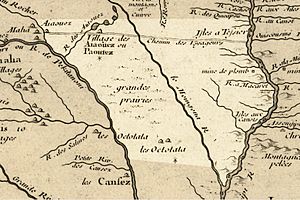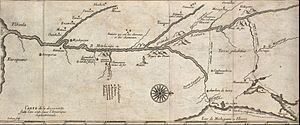Moingona facts for kids
The Moingona were an old Native American tribe. They were part of the larger Miami-Illinois group. They were close friends with, or even part of, the Peoria tribe. Around the year 1700, they joined the Peoria tribe and became one with them. Today, their descendants are part of the Peoria Tribe of Indians of Oklahoma. This tribe is officially recognized by the government.
Contents
Discovering the Moingona Tribe
In 1672, a French explorer named Jacques Marquette wrote about different Native American tribes. He noted that the Peolualen (who are now the Peoria) and the Mengakonkia (Moingona) were part of the Ilinoue (Illinois) tribes. He said they all "speak the same language." This means they could understand each other easily.
A year later, in 1673, Marquette and another explorer, Louis Jolliet, went on an expedition. They left their canoes and walked onto the prairie. They found three Illinois villages close to each other. Marquette named one village the peouarea. Later, a map that seems to be by him named another village the Moingwena. He mentioned that there was "some difference in their language," but they could still understand each other well.
In 1700, a priest named Father Jacques Gravier wrote about helping the "Peouaroua and Mouingoueña." These tribes were close allies. He helped them deal with a common enemy.
In 1721, a missionary named Pierre François Xavier de Charlevoix explored the region. He wrote about "le Moingona" as a "magnificent Prairie." This prairie was full of animals like buffalo. He used the italic word to show it was a place name. He also noted that "one of the tribes bears that name." Charlevoix's spelling of Moingona is often used today.
What Does the Name Moingona Mean?
The name Moingona likely inspired the names of several places. These include the City of Des Moines, the Des Moines River, and Des Moines County, Iowa.
Other names for the Moingona tribe were also used in old records. In 1672–73, they were sometimes called "Mengakoukia" or "Mangekekis."
Moingona: People by the Portage
Old stories suggest that "Moingona" referred to people who lived near a "portage." A portage is a place where people carry their canoes or boats over land. This was done to get around dangerous parts of a river. In this case, it was around the Des Moines Rapids.
A famous mapmaker, Joseph Nicollet, agreed with this idea. So did a language expert, Henry Schoolcraft. They said that "Moingona" is a changed version of an Algonquian word. That word is Mikonang, which means at the road.
This "road" was a well-known path. People used it to travel between the lower rapids and their homes on the river. This path helped them avoid the rapids. Even today, people in that area still use similar ways to travel.
Moingona: The Loon Clan
Another idea about the name's meaning is that Moingona comes from a clan name. Many Native American tribes had clans, like a family group. This idea suggests it comes from the "Loon" clan. The Miami Indian word for loon is maankwa. Many villages were named after their tribal clans.
 | Janet Taylor Pickett |
 | Synthia Saint James |
 | Howardena Pindell |
 | Faith Ringgold |



